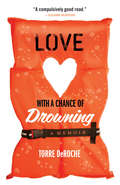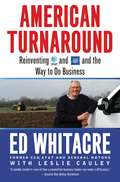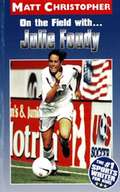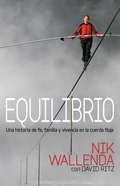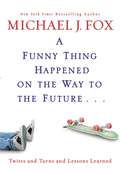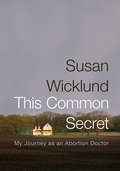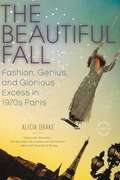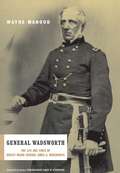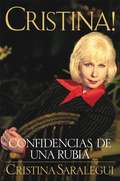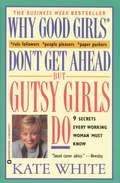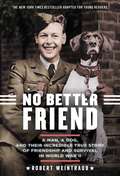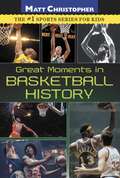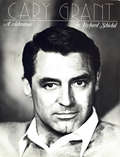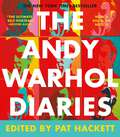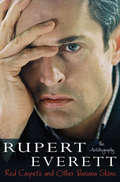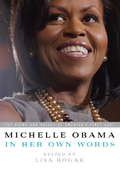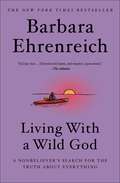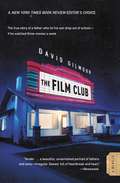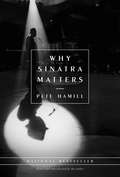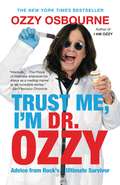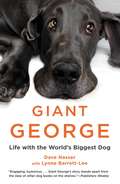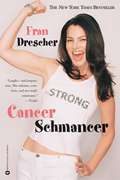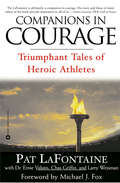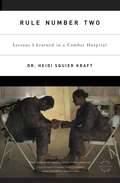- Table View
- List View
Love with a Chance of Drowning
by Torre DeRocheNew love. Exotic destinations.A once-in-a-lifetime adventure.What could go wrong? City girl Torre DeRoche isn't looking for love, but a chance encounter in a San Francisco bar sparks an instant connection with a soulful Argentinean man who unexpectedly sweeps her off her feet. The problem? He's just about to cast the dock lines and voyage around the world on his small sailboat, and Torre is terrified of deep water. However, lovesick Torre determines that to keep the man of her dreams, she must embark on the voyage of her nightmares, so she waves good-bye to dry land and braces for a life-changing journey that's as exhilarating as it is terrifying. Somewhere mid-Pacific, she finds herself battling to keep the old boat, the new relationship, and her floundering sanity afloat. . . . This sometimes hilarious, often harrowing, and always poignant memoir is set against a backdrop of the world's most beautiful and remote destinations. Equal parts love story and travel memoir, Love with a Chance of Drowning is witty, charming, and proof positive that there are some risks worth taking.
American Turnaround: Reinventing AT&T and GM and the Way We Do Business in the USA
by Leslie Cauley Edward WhitacreEd Whitacre is credited with taking over the corporate reins at General Motors (GM) when the automotive manufacturer was on the brink of bankruptcy during 2009 and turned the company around in magnificent fashion. In this business memoir, the native Texan explores his unique management style, business acumen and patriotism.It was President Obama who reached out to Ed Whitacre to come out of retirement and take over GM in 2009. A down-to-earth, no-nonsense Texas native with a distinctive Texas twang in his voice, Whitacre was reluctant to come out of retirement to work at GM. But Whitacre is that rare CEO with great charisma and extraordinary management instincts. And when he got to Detroit, he started to whittle down the corporate bureaucracy right away - and got GM back on track in record timeBefore being pulled out of retirement to run GM by Obama, Ed Whitacre had spent his entire corporate career in the telecom business, where he ultimately ended up running AT&T.
On the Field with... Julie Foudy
by Matthew F ChristopherThe number one sports writer for kids presents a biography of Julie Foudy, who was a co-captain of the Gold Medal-winning U. S. women's Olympic soccer team in 1996 and played on the U. S. National Team that won the Women's World Cup in 1999. Photos.
Equilibrio: Una historia de fe, familia y vivencia en la cuerda floja
by David Ritz Nik WallendaNik Wallenda, "King of the High Wire," doesn't know fear. As a seventh generation of the legendary Wallenda family, he grew up performing, entertaining, and pushing the boundaries of gravity and balance. When Nik was four years old, he watched a video from 1978 of his great grandfather, Karl Wallenda, walking between the towers of the Condado Plaza Hotel in Puerto Rico, stumbling, and falling to his death because of improper rigging. When Nik heard his father quote his great-grandfather-"Life is on the wire, everything else is just waiting"-the words resonated deep within his soul and he vowed to be a hero like Karl Wallenda. Balance is the theme of Nik's life: between his work and family, his faith in God and artistry, his body and soul. It resonates from him when performing and when no one is looking. When walking across Niagara Falls, he prayed aloud the entire time, and to keep his lust for glory and fame in check, Nik returned to the site of his performance the next day and spent three hours cleaning up trash left by the crowd. Nik Wallenda is an entertainer who wants to not only thrill hearts, but to change hearts for Christ. Christ is the balance pole that keeps him from falling.Nik Wallenda is an entertainer who wants to not only thrill hearts, but to change hearts for Christ. Christ is the balance pole that keeps him from falling.
A Funny Thing Happened on the Way to the Future: Twists and Turns and Lessons Learned
by Michael J. FoxMichael J. Fox abandoned high school to pursue an acting career, but went on to receive honorary degrees from several universities and garner the highest accolades for his acting, as well as for his writing. In his new book, he inspires and motivates graduates to recognize opportunities, maximize their abilities, and roll with the punches--all with his trademark optimism, warmth, and humor. In A Funny Thing Happened on the Way to the Future, Michael draws on his own life experiences to make a case that real learning happens when "life goes skidding sideways." He writes of coming to Los Angeles from Canada at age eighteen and attempting to make his way as an actor. Fox offers up a comically skewed take on how, in his own way, he fulfilled the requirements of a college syllabus. He learned Economics as a starving artist; an unexpected turn as a neophyte activist schooled him in Political Science; and his approach to Comparative Literature involved stacking books up against their movie versions. Replete with personal stories and hilarious anecdotes, Michael J. Fox's new book is the perfect gift for graduates.
This Common Secret: My Journey as an Abortion Doctor
by Susan Wicklund Alan KesselheimIn This Common Secret Dr. Susan Wicklund chronicles her emotional and dramatic twenty-year career on the front lines of the abortion war. Growing up in working class, rural Wisconsin, Wicklund had her own painful abortion at a young age. It was not until she became a doctor that she realized how many women shared her ordeal of an unwanted pregnancy#151;and how hidden this common experience remains. This is the story of Susan's love for a profession that means listening to women and helping them through one of the most pivotal and controversial events in their lives. Hers is also a calling that means sleeping on planes and commuting between clinics in different states#151;and that requires her to wear a bulletproof vest and to carry a . 38 caliber revolver. This is also the story of the women whom Susan serves, women whose options are increasingly limited. Through these intimate, complicated, and inspiring accounts, Wicklund reveals the truth about the women's clinics that anti-abortion activists portray as little more than slaughterhouses for the unborn. As we enter the most fevered political fight over abortion America has ever seen, this raw and powerful memoir shows us what is at stake.
The Beautiful Fall: Fashion, Genius, and Glorious Excess in 1970s Paris
by Alicia Drake"Deliciously dramatic... The Beautiful Fall crackles with excitement."-New York Times Book Review In the 1970s, Paris fashion exploded like a champagne bottle left out in the sun. Amid sequins and longing, celebrities and aspirants flocked to the heart of chic, and Paris became a hothouse of revelry, intrigue, and searing ambition. At the center of it all were fashion's most beloved luminaries - Yves Saint Laurent, the reclusiveenfant terrible,and Karl Lagerfeld, the flamboyant freelancer with a talent for reinvention - and they divided Paris into two fabulous halves. Their enduring rivalry is chronicled in this dazzling exposé of an era: of social ambitions, shared obsessions, and the mesmerizing quest for beauty. "Fascinating." - New York Times "Addictive." - Philadelphia Inquirer "It's like US Weekly, 1970s style." - Gotham "A story constructed as exquisitely as a couture dress. . . . It moves stylishly forward, with frequent over-the-shoulder glances at some very dishy background." - Boston Globe
General Wadsworth: The Life and Times of Brevet Major General James S. Wadsworth
by Wayne MahoodJames S. Wadsworth was a successful lawyer and influential New York politician when the Civil War broke out. His wealth, strong anti-slavery views, and active support of President Lincoln made him a controversial public figure in the early war years. In 1863, he was given a field command and proved himself to be one of the Union's most able and daring commanders, although he died before the war ended. His battlefield boldness and righteous resolve to end slavery is, as former U. S. Congressman James W. Symington says, "a vivid reminder that our Civil War was, indeed, fought on moral grounds. "
Cristina!: Confidencias de Una Rubia
by Cristina SaraleguiMeet Cristina the superstar. The granddaughter of the foremost publishing czar in Cuba, she fled as an adolescent to the United States after the revolution. A young woman working her way up through the ranks of the North American-based Spanish-language media, she eventually assumed the reins of Cosmopolitan en Espanol. After ten years with Cosmopolitan, Cristina made the boldest move of her career - creating and hosting El Show de Cristina, the talk show she has developed into the phenomenon seen by 100 million worldwide. Friend and confidante to celebrities both inside and outside the Hispanic world, she also hosts a radio show heard all over Latin America and publishes the magazine Cristina La Revista, read avidly by thousands of fans every month. "Meet Cristina the Motivator. Groundbreaker and role model for women everywhere - especially Latinas - she offers advice, based on the life she has lived and the wisdom she has earned, on overcoming racial and sexual discrimination... raising children... keeping a happy marriage... growing older gracefully... and the Winner's Ten Commandments."--BOOK JACKET.Title Summary field provided by Blackwell North America, Inc. All Rights Reserved
Why Good Girls Don't Get Ahead... But Gutsy Girls Do: Nine Secrets Every Working Woman Must Know
by Kate WhiteFor years Kate White lived as a good girl - a rule follower, a people pleaser, a busy beaver - until she was passed over for the job of editor-in-chief of a magazine she had been running for months. She finally realized that being gutsy, not good, was the only way to succeed. And did she ever! Kate went on to create a bold new editorial position at one magazine, she accepted the top spot at another when she was seven months pregnant, and she became editor-in-chief at McCall's magazine as a working mother who intended to spend time with her kids. Today she is the editor-in-chief of Redbook, one of the hottest magazines in the country. Now Kate White tells you how she changed her style and self-image - and gives you specific, straight-from-the-shoulder advice about how to put your life in high gear and make your own career dreams come true. Based on how the real world works, her nine-step program shows you how to get ahead and get what you want. Beginning with a revealing self-test for you to determine how good, or gutsy, you are right now, White reveals the nine strategies every career woman must know, while she shares the inside stories of how other gutsy women - like Revlon's Andrea Robinson, television host Nancy Glass, renowned decorator Alexandra Stoddard, Easy Spirit shoe exec Claire Brinker, and former Reagan media advisor Merrie Spaeth - became stars in their fields.
No Better Friend: A Man, a Dog, and Their Incredible True Story of Friendship and Survival in World War II
by Robert WeintraubA middle-grade edition of the New York Times bestselling No Better Friend-the extraordinary tale of friendship and survival in World War IINo Better Friend tells the incredible true story of Frank Williams, a radarman in Britain's Royal Air Force, and Judy, a purebred pointer, who met as prisoners of war during World War II. Judy, who became the war's only official canine POW, was a fiercely loyal dog who sensed danger-warning her fellow prisoners of imminent attacks and, later, protecting them from brutal beatings. Frank and Judy's friendship, an unbreakable bond forged in the worst circumstances, is one of the great recently uncovered stories of World War II. As they discover Frank and Judy's story in this specially adapted text, young readers will also learn about key World War II moments through informative and engaging sidebars, maps, photographs, and a timeline.
Great Moments in Basketball History
by Matt ChristopherThe history of basketball is chock-full of famous buzzer-beating shots, amazing game-saving plays, and thrilling maneuvers that defy gravity. All fans have their favorite memory, just as they have their favorite team and their favorite player. Now here's a book that offers a look back at more than fifteen of the sport's best moments. The Block, The Steal, The Shot. Chamberlain, Abdul-Jabbar, Bird , Jordan , and James. Each entry captures the nail-biting tension of the minutes leading up to the play, as well as information about the superstar players that made them and the teams that they played for. Packed with facts and action, this is a book young basketball fans will reach for again and again -- and because it comes from Matt Christopher, young readers know they're getting the best sports writing on the shelf.
Cary Grant: A Celebration
by Richard SchickelRichard Schickel's text, combining critical analysis and a re-interpretation of all the available biographical information, masterfully maps the intersections where a great star's personal history and his screen personality met in a style as elegant, graceful and witty as the actor himself.
The Andy Warhol Diaries
by Andy Warhol Pat HackettIn celebration of its 25th anniversary, the bestselling classic is introduced to a new generation-with an added preface by Warhol's diarist and long-time friend, Pat Hackett, contemplating Warhol's lasting cultural impact. This international literary sensation turns the spotlight on one of the most influential and controversial figures in American culture. Filled with shocking observations about the lives, loves, and careers of the rich, famous, and fabulous, Warhol's journal is endlessly fun and fascinating. Spanning the mid-1970s until just a few days before his death in 1987, THE ANDY WARHOL DIARIES is a compendium of the more than twenty thousand pages of the artist's diary that he dictated daily to Pat Hackett. In it, Warhol gives us the ultimate backstage pass to practically everything that went on in the world-both high and low. He hangs out with "everybody": Jackie O ("thinks she's so grand she doesn't even owe it to the public to have another great marriage to somebody big"), Yoko Ono ("We dialed F-U-C-K-Y-O-U and L-O-V-E-Y-O-U to see what happened, we had so much fun"), and "Princess Marina of, I guess, Greece," along with art-world rock stars Jean-Michel Basquiat, Francis Bacon, Salvador Dali, and Keith Haring. Warhol had something to say about everyone who crossed his path, whether it was Lou Reed or Liberace, Patti Smith or Diana Ross, Frank Sinatra or Michael Jackson. A true cultural artifact, THE ANDY WARHOL DIARIES amounts to a portrait of an artist-and an era-unlike any other.
Red Carpets and Other Banana Skins: The Autobiography
by Rupert EverettRevealing himself to be a consummate storyteller, stage and screen star Everett ("My Best Friend's Wedding") pens a delightfully witty memoir in which he reveals his life experiences as an up-and-coming actor, detailing everything from the eccentricities of the British upper class to the madness of Hollywood.
Michelle Obama in her Own Words
by Lisa Rogak Michelle ObamaIn time for Mother's Day, the companion book to the "New York Times" bestseller "Barack Obama in His Own Words""
Living with a Wild God: A Nonbeliever's Search for the Truth about Everything
by Barbara EhrenreichIn middle age, Ehrenreich came across the journal she had kept during her tumultuous adolescence and set out to reconstruct that quest, which had taken her to the study of science and through a cataclysmic series of uncanny-or as she later learned to call them, "mystical"-experiences. A staunch atheist and rationalist, she is profoundly shaken by the implications of her life-long search. Part memoir, part philosophical and spiritual inquiry, LIVING WITH A WILD GOD brings an older woman's wry and erudite perspective to a young girl's uninhibited musings on the questions that, at one point or another, torment us all. Ehrenreich's most personal book ever will spark a lively and heated conversation about religion and spirituality, science and morality, and the "meaning of life." Certain to be a classic, LIVING WITH A WILD GOD combines intellectual rigor with a frank account of the inexplicable, in Ehrenreich's singular voice, to produce a true literary achievement.
The Film Club: A Memoir
by David Gilmour"I loved David Gilmour's sleek, potent little memoir, The Film Club. It's so, so wise in the ways of fathers and sons, of movies and movie-goers, of love and loss." --- Richard Russo, Pulitzer Prize winning author of Empire Falls "If all sons had dads like David Gilmour, then Oedipus would be a forgotten legend and Father's Day would be a worldwide film festival."--Sean Wilsey, author of Oh the Glory of It All"David Gilmour is a very unlikely moral guidance counselor: he's broke, more or less unemployed and has two children by two different women. Yet when it looks as though his teenage son is about to go off the rails, he reaches out to him through the only subject he knows anything about: the movies. The result is an object lesson in how fathers should talk to their sons." --Toby Young, author of How to Lose Friends & Alienate People At the start of this brilliantly unconventional family memoir, David Gilmour is an unemployed movie critic trying to convince his fifteen-year-old son Jesse to do his homework. When he realizes Jesse is beginning to view learning as a loathsome chore, he offers his son an unconventional deal: Jesse could drop out of school, not work, not pay rent - but he must watch three movies a week of his father's choosing. Week by week, side by side, father and son watched everything from True Romance to Rosemary's Baby to Showgirls, and films by Akira Kurosawa, Martin Scorsese, Brian DePalma, Billy Wilder, among others. The movies got them talking about Jesse's life and his own romantic dramas, with mercurial girlfriends, heart-wrenching breakups, and the kind of obsessive yearning usually seen only in movies. Through their film club, father and son discussed girls, music, work, drugs, money, love, and friendship - and their own lives changed in surprising ways.
Why Sinatra Matters
by Pete HamillIn this unique homage to an American icon, journalist and award-winning author Pete Hamill evokes the essence of Sinatra--examining his art and his legend from the inside, as only a friend of many years could do. Shaped by Prohibition, the Depression, and war, Francis Albert Sinatra became the troubadour of urban loneliness. With his songs, he enabled millions of others to tell their own stories, providing an entire generation with a sense of tradition and pride belonging distinctly to them.
Extreme: My Autobiography
by Sharon OsbourneAs the daughter of notorious rock manager Don Arden, Sharon Osbourne's childhood was an unruly mix of glamour and violence. In her late 20s, Sharon finally made the painful decision to break with her family. Always irrepressible, Sharon flourished, creating a loving family of her own while becoming a legendary manager and rock band promoter. In rock star Ozzy Osbourne, Sharon found her soul mate, yet Ozzy's drug and drink-fuelled excesses, which culminated in his attempt to strangle her, made their marriage a white knuckle ride from the start; only her devotion to their three children gave her the will to survive. From the tremendous highs of the hit show The Osbournes to the lows of Ozzy's near-fatal quad-bike accident and her own bout with colon cancer, Sharon's tenacity, honesty, and humour have triumphed again and again.
Trust Me, I'm Dr. Ozzy: Advice from Rock's Ultimate Survivor
by Chris Ayres Ozzy OsbourneWondering if science could explain how he survived his 40-year avalanche of drugs and alcohol, Ozzy Osbourne became one of a handful of people in the world to have his entire DNA mapped in 2010. It was a highly complex, $65,000 process, but the results were conclusive: Ozzy is a genetic anomaly. The "Full Ozzy Genome" contained variants that scientists had never before encountered and the findings were presented at the prestigious TEDMED Conference in San Diego-making headlines around the world. The procedure was in part sponsored by The Sunday Times of London, which had already caused an international fururoe by appointing Ozzy Osbourne its star health advice columnist. The newpaper argued that Ozzy's mutliple near-death experiences, 40-year history of drug abuse, and extreme hypocondria qualified him more than any other for the job. The column was an overnight hit, being quickly picked up by Rolling Stone to give it a global audience of millions. In TRUST ME, I'M DR. OZZY, Ozzy answers reader's questions with his outrageous wit and surprising wisdom, digging deep into his past to tell the memoir-style survival stories never published before-and offer guidance that no sane human being should follow. Part humor, part memoir, and part bad advice, TRUST ME, I'M DR. OZZY will include some of the best material from his published columns, answers to celebrities' medical questions, charts, sidebars, and more.
Giant George: Life with the World's Biggest Dog
by Lynne Barrett-Lee Dave NasserWith his big blue eyes and soulful expression, George was the irresistible runt of the litter. But Dave and Christie Nasser's "baby" ended up being almost five feet tall, seven feet long, and 245 pounds. Eager to play, and boisterous to the point of causing chaos, this big Great Dane was scared of water, scared of dogs a fraction of his size and, most of all, scared of being alone. GIANT GEORGE is the charming story of how this precocious puppy won Dave and Christie's hearts and along the way became a doggie superstar. In 2010, George was named by Guinness World Records as the Tallest Dog in the World-ever. He appeared on Oprah, and even has his own global fan club. But to Dave and Christie, this extraordinary animal is still their beloved pet, the one who has made them laugh, made them cry, and continues to make them incredibly happy.
Cancer Schmancer (Biography Ser.)
by Fran DrescherPart inspirational cancer-survival story, part memoir-as-a-laugh-riot, CANCER SCHMANCER picks up where Fran's last book, Enter Whining, left off. After the publication of that book, Fran's life launched into a downward spiral. She separated from a long and complicated relationship, her TV series started to slip in the ratings, and the health of her beloved dog Chester was failing fast. Then came the mysterious symptoms no doctor could explain. With her trademark sense of humor, Fran tells of her long search for answers and the cancer diagnosis that she ultimately beat. But not before a gold mine of insights were revealed to her about the importance of taking charge of your own health and recognizing what's most important in life.
Companions in Courage: Triumphant Tales of Heroic Athletes
by Pat Lafontaine Ernie Valutis Chas Griffin Larry WeismanFrom one of the greatest hockey players in NHL history comes a collection of inspiring true stories about athletic heroes who have persevered in the face of overwhelming odds. Before his retirement from the NHL in 1998, Pat Lafontaine inspired fans everywhere by battling back from the side effects of several serious head injuries and returning to the ice. Now, in this fascinating collection of true stories, he shares the personal details of his own struggle with depression and physical rehabilitation, as well as those of other amazing athletes who were challenged by adversityand won. From the hockey player at Northeastern University who lives with cystic fibrosis, to a young girl who overcame a double amputation to become a star sprinter, to the volleyball coach at Columbine High School who lost his daughter in that tragedy, these are stories of gifted young athletes whothrough their exampleswill inspire others with the determination, courage, and winning spirit necessary to break through lifes road-blocksand succeed.
Rule Number Two: Lessons I Learned in a Combat Hospital
by Heidi Squier KraftWhen Lieutenant Commander Heidi Kraft's twin son and daughter were fifteen months old, she was deployed to Iraq. A clinical psychologist in the US Navy, Kraft's job was to uncover the wounds of war that a surgeon would never see. She put away thoughts of her children back home, acclimated to the sound of incoming rockets, and learned how to listen to the most traumatic stories a war zone has to offer.One of the toughest lessons of her deployment was perfectly articulated by the TV show M*A*S*H: "There are two rules of war. Rule number one is that young men die. Rule number two is that doctors can't change rule number one." Some Marines, Kraft realized, and even some of their doctors, would be damaged by war in ways she could not repair. And sometimes, people were repaired in ways she never expected. RULE NUMBER TWO is a powerful firsthand account of providing comfort admidst the chaos of war, and of what it takes to endure.
